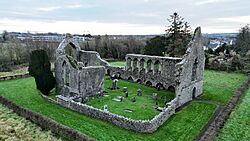Roscommon Abbey facts for kids
| Mainistir Ros Comáin | |

Roscommon Abbey in 2024
|
|
| Monastery information | |
|---|---|
| Other names | Ros-comain; Ros-chomon; Ros-camain; Ros-coman |
| Order | Canons Regular of Saint Augustine/Dominicans |
| Established | 1140 |
| Disestablished | 1578 |
| Diocese | Elphin |
| Architecture | |
| Status | ruined |
| Style | Norman |
| Site | |
| Location | Ballypheasan, Roscommon, County Roscommon |
| Coordinates | 53°37′29.158″N 8°11′30.487″W / 53.62476611°N 8.19180194°W |
| Public access | yes |
| Official name | Roscommon Abbey |
| Reference no. | 362 |
Roscommon Abbey is an old monastery in Roscommon, Ireland. It used to be home to a group of monks called Dominicans. Today, it is a National Monument, which means it's a very important historical site protected by the country.
History of Roscommon Abbey
Roscommon Abbey was first built in 1253. It was founded by Fedlim Ó Conchobair, who was the king of a region called Connacht. The abbey was a home for Dominican monks.
Over the years, the abbey faced some tough times. In 1260, it was attacked and robbed by a group led by Mac William de Burgo. Later, in 1270, a fire damaged the building. In 1308, lightning struck the abbey, causing more damage.
The abbey stopped being used as a monastery before 1578. Its ownership changed hands several times after that. In 1578, it was given to Sir Nicholas Malby, and in 1615, it went to Francis Annesley, 1st Viscount Valentia.
What the Abbey Looked Like
Roscommon Abbey is located in the southern part of Roscommon town. The main church building had a long central area, like a hallway, called an aisle. This aisle included the nave, where people sat, and the choir, where the monks sang.
In the 1400s, a northern transept was added. A transept is a part of a cross-shaped church that sticks out on the sides.
The King's Tomb
King Fedlim Ó Conchobair, who founded the abbey, passed away in 1265. He was buried inside the abbey. His tomb is covered by a special stone slab with his image carved on it. You can still see this carving in a corner of the church.
This carved image was made between 1290 and 1300. It is one of only two surviving royal carvings from that time in Ireland. It gives us a rare look at how kings were honored long ago.
Images for kids
 | John T. Biggers |
 | Thomas Blackshear |
 | Mark Bradford |
 | Beverly Buchanan |







